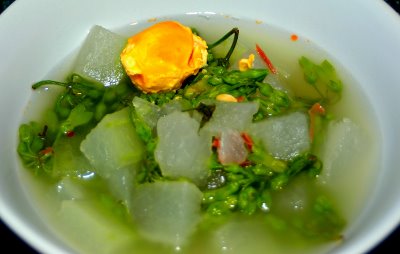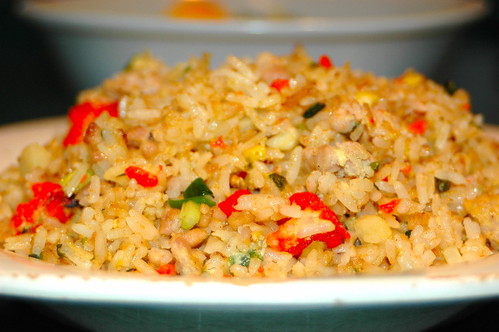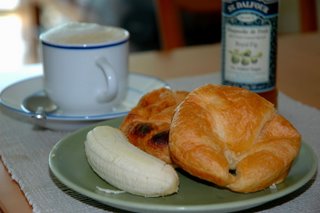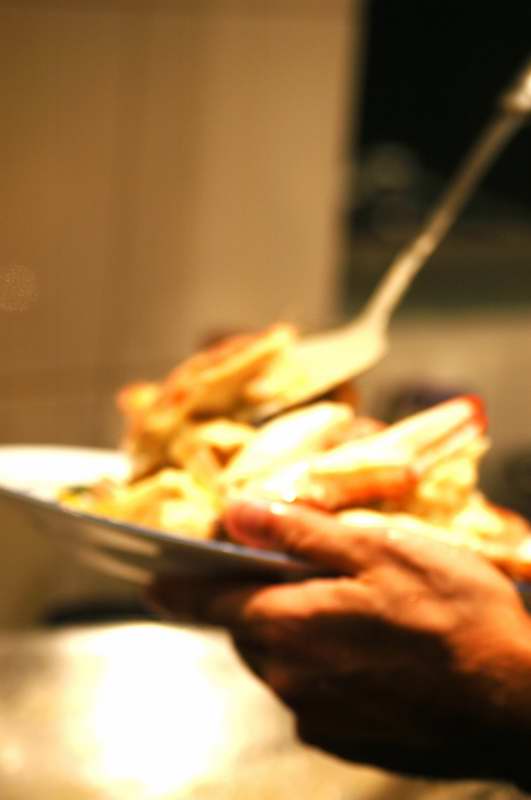Saturday, September 30, 2006
Tuesday, September 26, 2006
Winter Melon, Bidding Summer Farewell
We are into the autumn, aren't we? This time of the year it is most often associated with a bout of melancholic heaviness. So the best is to go light with everything we do. Walk a little lighter. Talk a little lighter. Breathe a little lighter. And, most of all, eat a little lighter...
Winter melon (冬瓜) is such a name. It's not sweet but it's still called melon. It grows only during the summer and early autumn but its name is thoroughly misleading. If anyone knows why, please please explain to me.
This melon is as obsessive as other green creatures that I've listed at this blog. I can easily think of ten different ways to cook it. Its translucent and succulent nature leaves a touch of tenderneess in the mouth. In Asian cooking, it is believed that the melon works as a coolant for the inner body temperature. Making soup with night-fragrant flowers (telosma cordata, 夜来香), it is the best cure for the heat and the strain.
Ingredients:
1. winter melon, a ½ inch slice is enough for myself;
2. a small bunch of night-fragrant flowers;
3. a piece of Japanese dried scallop;
4. small amount of Chinese aged ham, finely shredded; and
5. a piece of Chinese duck egg yolk. Slice off the skin and seeds of the melon. Chop it into small cubes. Night-fragrant flowers (name speaks for itself!) should be washed and sit ready.
Slice off the skin and seeds of the melon. Chop it into small cubes. Night-fragrant flowers (name speaks for itself!) should be washed and sit ready.
Bring scallop and ham to a slow boil for ½ hour, with ½-¾ litre of water. This will be the soup base. Throw the egg yolk and boil for another 10 minutes. Add a small pinch of sea-salt.
Throw the melon in and bring the heat to medium for a couple of minutes, just when the cubes begin to turn translucent. Last go the flowers and let them be cooked for no more than 2 minutes.
I love this soup so much. Now the summer has quietly gone but the heat still lingers. I may only be able to get the last few slices of winter melon. Feelings are a little mixed right now. I'm not sure if it is the summer that I miss or the last piece of winter melon that I feel sad about.
Labels: recipe
Thursday, September 21, 2006
Tuesday, September 19, 2006
Ryuichi Sakamoto, 2002
I returned home yesterday from Rio in Brazil. A three-hour time change from New York. Since it is in the Southern Hemisphere, right now it's in the middle of the summer there. It's still another month to Carnival. Walking around you can hear the samba schools feverishly practicing, deep into the night. The temperature is 35°C every day. Since I had gone there from below-freezing New York, I had a terrible time getting my body to adjust to the hot temperature. Since I sleep without air-conditioning, I woke up a lot during the night from the heat, and went around for days without enough sleep. When I would say, "I'm in Rio" everyone would go "Oh, wow, that's so great!" but of course I wasn't there for a vacation. I was there for work. It wasn't only the temperature difference that was to blame for my sleep deprivation.
The work this time was to record the music of Jobim on the very piano Jobim had in his home, with the Morelenbaums, the couple who had made music with Jobim for 15 years when he was alive. Paolo Jobim, Jobim's eldest son, added his violao on two tracks. Jobim's spirit sighed here and there in the house. From the large window in the library, the views of Corcovado and Lagoa were exactly as they must have appeared when he had seen them. And Jobim's finger marks were still clearly there on the keyboard of the piano. It seems that when he was alive Jobim used to say he was a bird. In his library there are some old books by (Carlos) Castaneda. As I finished my piano solo during the recording of the first track, the sharp sound of a bird calling came through the open window, and it was exactly as if Jobim was laughingly saying to me, ironically, "Hey, Sakamoto, that's my piano. Play it tenderly." When Paula Morelenbaum told this story to Jobim's widow Ana in New York, she got goose bumps. The piano that had been dead for 6 years had come back to life, and music filled the house again. Jobim's long-time servants all stopped their chores and pricked up their ears at the music. Jobim was one of the angels of the 20th century.
With the situation being like this, my emotions were on overload and my adrenaline was flowing non-stop. At night I just couldn't fall asleep. But that wasn't the only reason for my fatigue. Rio is a huge city of 8 million people. Yet throughout the city the are big, rocky mountains. On one of them, Corcovado, a giant statue of Jesus faces eastward, standing with arms outstretched. I'm just guessing, but gravity is stronger here, although I don't know whether gravity differs that much from place to place. Or, I might go so far as to say unscientifically that it feels very fertile. All the people and animals and insects and plants that are living here, contrary to this fertility, or perhaps receiving its benefits, have an extraordinarily high life energy. Even the cheap and plentiful fruits and vegetables have a high life energy. When people who normally live in a place like that come to where gravity is weaker, their bodies become extremely light and their activity increases. Come to think of it, it's the same as when Hoshi Hyuuma (Star-leaping Stallion) of Kgyojin no Hoshi ("Star of Giants" manga series) puts on his "Major League Ball" training cast and afterward he has this amazing strength. Jaques Morelenbaum, when he's in Japan or Europe, moves like he's flying. But the same Jaques in Rio seems quiet. I'm sure that's normal for him in Rio.
Nine years ago the World Environment Conference was held in Rio and Jobim participated. There is no trash in the streets here, a huge difference from New York. Even on the 17 kilometers of beaches there is very little trash. I remember, from when I was first here 17 years ago, the sight of the cleaning people dressed in orange uniforms early in the morning. Lined up from side to side on the beach, they were slowly picking up trash. Brazil is indeed where Curitiba, the "Environmental Miracle City," is located. It's as if the towering mountains, pushing aside the clogged streets swollen with an ever-increasing population, are protecting Nature. Yet even now the deforestation of the Amazon continues. Jobim said at the time, "If God is letting 3 million trees get knocked down in the Amazon, then they must be getting reborn somewhere else. Undoubtedly, if there are monkeys in such a place there are also flowers, and clean water must be flowing. When I die, you know, that is where I'm going."
While we were recording, a tortoise suddenly appeared in the back yard of the Jobim house. The tortoise seemed to have a will as strong as that of the grandfather of someone I know who was born in the Meiji Period. I wonder if that was the reincarnation of Jobim's grandfather Asor, an agnostic!
Labels: sound
Sunday, September 17, 2006
Thursday, September 14, 2006
Of the world's 1.09 billion extremely poor people, about 74% or 810 million live in marginal areas and rely on small-scale agriculture for their livelihood. In most developing countries, agriculture continues to be the most important sector of the economy, accounting for the biggest proportion of employment. As such, unless effective strategies for agriculture development are successfully implemented, ending rural poverty will remain a distant goal.
During the past few decades, the Green Revolution has brought about significant changes in the world's food production systems. It is recognized that while the Green Revolution has benefited better-off farmers in irrigated areas, it has by-passed the poor in marginal areas. Low-external input sustainable agriculture (LEISA) has long been viewed as an alternative for areas where the Green Revolution technologies are not feasible. More recently, one particular alternative that has gained interest is organic agriculture, due to its commercial viability. Most farmers in marginal areas practice traditional agriculture methods using very little or no agrochemicals. By adopting organic agriculture (OA), which requires less financial inputs while placing more reliance on natural and human resources, farmers could move towards more sustainable agricultural practices. Improving the agricultural production system in marginal areas in a sustainable manner and providing market access for the poor hold the key to the mass reduction of poverty...
Sununtar Setboonsarng
Asian Development Bank Institute
Download full paper "Organic Agriculture, Poverty Reduction, and the
Millennium Development Goals"
Labels: food science
Sunday, September 10, 2006
Crab Yolk Fried Rice with Water Chestnut and Minced Pork
 這個星期, 累極了, 辦公室的, 学校的, 透不過气來... 今個週末空閒時間雖然不多, 但總要花点, 好好地對待自己...
這個星期, 累極了, 辦公室的, 学校的, 透不過气來... 今個週末空閒時間雖然不多, 但總要花点, 好好地對待自己...今天到街市, 碰到有海青蟹供應。 對! 是漁家從海捕來的, 是這裡東涌的特色之一。一般街市買到, 都是魚場飼養, 欠缺應有的鮮甜味道。大嶼山海岸一帶, 仍有少部份漁家, 產量不多, 我相信絕大部份都是供給本地用家為主。
我買了一隻羔蟹, 有大半斤重, 買了些半肥腩肉, 攪碎。 對! 本來, 用人手硺是最好的, 但實在太累啦。也買來幾顆馬蹄... 看似是做羔蟹肉餅哩? 醉翁之意不在酒...
先將蟹洗淨, 海蟹特別多泥, 要用多兩成功力。然後起羔, 將蟹斬成四件, 待用。
將馬蹄切碎, 打勻一隻雞蛋。然後將蟹羔、馬蹄、雞蛋和豬肉輕輕地撈起來, 加少量海鹽及生磨胡椒粉, 再將蟹件放上面, 強火蒸15分鐘。
一碟馬蹄羔蟹蒸肉餅, 就此完成...
等一等! 今次的主角, 不是蟹粉炒飯嗎?
將蟹件拿起, 將肉餅輕輕弄散。 準備少許薑絲, 將飯預先煮好及打鬆。人家喜歡用隔夜飯炒, 我不喜歡, 因為隔夜飯太乾了。只要煮飯的時候, 將水量收減些少便成。
用強火起鑊, 爆薑絲, 隨即落飯及肉餅, 少許海鹽及生磨胡椒粉, 炒3-4分鐘。收火前落些碎葱, 即成!
今晚一個人享用... 因為, 偶然獨食, 是minimalist cooking的最高境界噢!
Labels: recipe
Wednesday, September 06, 2006
Haja o que houverhá sempre um homem para uma mulher
E há de sempre haver
para esquecer um falso amor
E uma vontade de morrer
Seja como for
há de vencer o grande amor,
Que há de ser no coração
Como um perdão pra quem chorou
Vocal: Paula Morelenbaum
Cello: Jaques Morelenbaum
Piano: Ryuichi Sakamoto
Recorded and shot at the House of Jobim, Rio de Janeiro, Brazil
Jaques: Paulo Jobim brought us the manuscript of this pre-bossa nova jewel, a samba that Ryuichi presents to us in his inspired introduction as a classical "lied." This song features the enormous talent of percussionist Marco Suzano, playing the surdo, pandeiro and cuica.
Ryuichi: While we were recording, Jaques suddenly said, "The intro should be just you on the piano, Ryuichi." So I put this intro together on the spot.
Labels: sound



